
Topics
Guests
- Andrea Taylorpresident and CEO of the Birmingham Civil Rights Institute.
- DeJuana Thompsonfounder of Woke Vote and chair of the Birmingham Committee for Truth and Reconciliation.
The Birmingham Civil Rights Institute sparked international outrage in January when it rescinded the Fred L. Shuttlesworth award for civil rights icon Angela Davis, soon after the Birmingham Holocaust Education Center sent a letter urging the board to reconsider honoring her due to her support of the Boycott, Divestment and Sanctions movement. Facing swift and widespread outcry, the institute then reversed its decision and reinstated the award, but Davis has yet to accept it. Democracy Now! spoke with the president and CEO of the Birmingham Civil Rights Institute, Andrea Taylor, on Saturday, before an alternate event celebrating Angela Davis hosted by the Birmingham Committee for Truth and Reconciliation. We also spoke with DeJuana Thompson, founder of Woke Vote and a chair of the Birmingham Committee for Truth and Reconciliation.
More from this Interview
- Part 1: Jewish Activists Hold Solidarity Shabbat Defending Angela Davis in Birmingham & Across U.S.
- Part 2: Angela Davis Returns to Birmingham, Reflecting on Palestinian Rights & Fight for Freedom Everywhere
- Part 3: Birmingham Civil Rights Group Reoffers Award to Angela Davis—But She Says Community Should Decide
- Part 4: Full Video: Angela Davis in Conversation with Imani Perry in Birmingham, Alabama
Transcript
AMY GOODMAN: After the news conference, Democracy Now! headed over to the Birmingham Civil Rights Institute to speak with the president and CEO of the organization at the center of the controversy. Andrea Taylor sat down with us in the institute’s library to talk about the Birmingham Committee for Truth and Reconciliation’s evening event and also—well, I began by asking her to explain what had taken place.
ANDREA TAYLOR: I think the record has been pretty clear and pretty thorough that the Birmingham Civil Rights Institute selected Dr. Angela Davis as the recipient for the 2018 award, the Fred Shuttlesworth Human Rights Award, which is our highest honor, given to those who have demonstrated commitment and courage and consistent, unwavering support of and advocacy for human rights. And we announced the award in the fall, and people were very excited that this would be happening, that Dr. Davis was receiving the award, was to be the recipient. And it was a homecoming for her. As you know, she was born and raised here in Birmingham and has had a distinguished career as a scholar, as an activist and as a champion of human rights.
Several months after the announcement, as people were buying tickets and getting ready to participate in the event, a group from the community raised concerns and objection to her selection. And subsequently, there was a decision taken by the board to rescind the award. And then later, the award was restored, and the rescission was revoked. And we hope that there will be an opportunity in the future to give the award to Dr. Davis.
But we’re very glad that she was—an unfortunate set of circumstances that brought us to that moment, but we’re very delighted that—certainly, that she’s here today and that she is being celebrated and welcomed back to her hometown and acknowledged for the work that she has done in a career that has been fully devoted to activism and to the promotion and preservation of human rights, which is always a messy business, one way or another, isn’t it?
AMY GOODMAN: Well, we just went to Angela Davis’s news conference, that she held at her old elementary school, Tuttle Elementary School. And she also went through what took place, that in October you invited her, announced she would be receiving the award, and then this decision was made right after New Year’s. Could you explain—you said a group got in touch with the Birmingham Civil Rights Institute. What group?
ANDREA TAYLOR: Well, there wasn’t—again, I think the record shows the chronology and what happened, but there was concern expressed about her activism in the Israeli-Palestinian conflict. And there were—we learned of this through social media, which now has become a vehicle for campaigns for people who object to many things. And so, it was initiated by that group. We learned of it through social media, actually. And it was an unfortunate set of circumstances that led to the decision by the board to rescind the award, and given that pressure.
But as we think about it now—and there was, you know, a great outcry—we learned something about how people all over the world feel a connection to Birmingham and its civil rights history. We know that it’s an unfortunate circumstance that led to the pressure that resulted in revoking the award. We think that restoring the award was the right thing to do. And we hope that a lesson has been learned about having the courage and being willing to advocate on behalf of that something that should actually happen.
AMY GOODMAN: One of the people who was very outspoken in his criticism was the mayor of Birmingham, Mayor Woodfin, who is an ex officio board member, is that right?
ANDREA TAYLOR: That is correct, yes.
AMY GOODMAN: Here at the Birmingham Civil Rights Institute, and said, “[M]embers of the community, Jewish and otherwise, were indeed vocal in their opposition [of] Dr. Davis receiving the Shuttlesworth Award.” And you received a letter from the Holocaust Education Center; they expressed their concern about her advocating for Palestinian rights. Now, Dr. Davis has said that she advocates for human rights in this country and around the world, as Dr. King did, and that she sees them as inseparable. She talks about the intersectionality of all these issues.
Once the board made their decision on January 4th in a conference call and then read her that decision on January 5th—I think it was a Saturday—that’s when some people learned this was even happening, apparently even some board members who weren’t in on the call. What made the board decide to reverse their decision to take that award back from her?
ANDREA TAYLOR: Well, I think that it’s something that the board should speak for themselves about.
AMY GOODMAN: Are you a member of the board?
ANDREA TAYLOR: I’m not a member of the board.
AMY GOODMAN: So you weren’t in on that emergency call?
ANDREA TAYLOR: I’m the staff person leading the organization. But I think that it—
AMY GOODMAN: Were you on that call?
ANDREA TAYLOR: It became clear that the body of work and the impact that Dr. Davis has had on a generation—several generations, actually—of leaders around civil and human rights, and her particular focus in the civil rights movement, warranted her receiving the award, that as I think was said when we announced, that we think that Reverend Fred Shuttlesworth would be very pleased and proud to see Dr. Davis as the recipient. And so the board came to understand that and determine that they would reverse the decision. And we’re very hopeful, as I said, that it was—that it will be something that she will come back to Birmingham, or we will go wherever, that we would have an opportunity to actually present the award to her and that she will agree to receive it.
AMY GOODMAN: So, you had the Birmingham City Council, you had the Birmingham School Board, all expressing, well, I guess you could say, just great dismay at the decision of the Birmingham Civil Rights Institute and expressing their support for Dr. Angela Davis. When you say this was a moment of learning, even for the board here, does that mean—and there were three board members who quit, right? The head of the board—
ANDREA TAYLOR: Yes.
AMY GOODMAN: —the vice chair of the board—
ANDREA TAYLOR: And the secretary.
AMY GOODMAN: —as well as the secretary. Does that—is it because they three were against conferring the award on her?
ANDREA TAYLOR: So, they made their own decision about whether to continue or not, and it was their choice to resign. I think that governance became also a question, as to how decisions were taken. But they chose to resign. And we have now vacancies on the board. And we’re focusing on how will we recruit board members who will carry forward the legacy and the narrative of Birmingham and its civil rights movement. And we want to be sure that we have individuals who understand the history and the complexity, and who will be good stewards of this institution and of the story that’s Birmingham civil rights.
AMY GOODMAN: Will the institute reveal how the board voted? I know a number of different groups have asked who voted against Dr. Davis, who voted to revoke this award, to begin with, that led to this sort of calamity within the community.
ANDREA TAYLOR: Yes, that information will be posted and be available to the public. But I think, really, the question is not just about who voted and how they voted, but really it’s a lesson for the community about how different events and different—a different historical narrative, or even the examination of the single person’s life, can be evaluated differently by different people at different points in a chronology and in a timeline.
AMY GOODMAN: Dr. Davis said, when asked if she would accept the Fred Shuttlesworth award, that at this point it’s not just up to her, that she wants it to be a community decision. And I’m wondering how you foresee that dialogue going forward?
ANDREA TAYLOR: I see it as absolutely critical. And we’ve already started that dialogue. We began that dialogue in January. We reached out to a number of the members of the Truth and Reconciliation Committee. We know them. This is a small community. They know us. Many of them are friends of the institute. Some are even former recipients of the Fred Shuttlesworth award, Mayor Richard Arrington being an example. He was a recipient of the award last year, in our 25th anniversary year. So, we know the individuals who are sponsoring today’s events. We’re pleased that they are doing that. Again, we think that this recognition is well deserved. And we would hope to continue to have a dialogue with them as we seek to bestow the Shuttlesworth award on Dr. Davis.
AMY GOODMAN: Have you gotten a chance to talk to Dr. Davis directly?
ANDREA TAYLOR: I have not. And I look forward to doing that and extending both apology and also admiration for the work that she has done and that she continues to do. And I look forward to reading the first of the books that might come out of her having donated her papers to the Schlesinger Library and what scholars might do in really trying to help understand what happened in this controversy and what the meaning and arc of her body of work has been over three-quarters of a century, I think she’s celebrated recently.
AMY GOODMAN: Do you want to just look into the camera and directly address Dr. Davis?
ANDREA TAYLOR: Well, Dr. Davis, I would just say that we admire you. You’re a daughter of Birmingham. You’ve had an outstanding career as an activist and an advocate, and continue to inspire. And we wish you well, and we’re delighted that you’re in town today.
AMY GOODMAN: That was Andrea Taylor, president and CEO of the Birmingham Civil Rights Institute, who was heading off to that evening’s event, in which 3,000 people went to welcome Dr. Davis and hear her conversation.
After the major event, I spoke with DeJuana Thompson, founder of Woke Vote, chair of the Birmingham Committee for Truth and Reconciliation, and I asked her what it would take for the committee to be comfortable with Dr. Davis accepting the Fred Shuttlesworth award from the Birmingham Civil Rights Institute.
DEJUANA THOMPSON: I think that whatever the turmoil is that’s happening at the BCRI, it reflects really a shift of ideas and power around what the institute really stands for, who they want to be in the community in the face of that. And I think, for us, we just want a transparent conversation about the root of some of this that has happened, because only with that transparency can we figure out how do we build from this moment and really heal.
We want to be sure—you know, everything that we’ve done, we’ve done with Dr. Davis’s legacy, her spirit in mind. So, we would certainly take our cues from her. We know that she’s rooted in restorative justice. And so, as she opened up with tonight, she doesn’t—no one wants to see the civil rights—the Birmingham Civil Rights Institute not be the beacon that it is to this community. We need the institute. We also need good leadership. And so, if we need to have conversations, if we need to do trainings, if we need to do mediation, whatever it’s going to take to ensure the trust of that leadership is renewed in the community, that’s what we’re committed to do.
AMY GOODMAN: And when you say transparency, what are you asking for?
DEJUANA THOMPSON: Well, we want to know: What was the real root cause? I think that is still nebulous and mysterious. We know that there were some—or, we were being told that there are some who just felt a certain kind of way maybe about some of her activism, some of her remarks. But we have a hard time reconciling that being strong enough, if you will, to rescind something as significant as that award.
And we hope that by having a transparent conversation, possibly getting the minutes from the meeting where it was, you know, brought to the attention of the board to consider it, that will start—that will give us a real and true place to start from. Until then, we’re speculating about how to deal with it. The community does not want to speculate. We want to coalesce around each other. We want to be activated around truth. And so, we need them to come to the table with truth.
AMY GOODMAN: DeJuana Thompson, founder of Woke Vote, chair of the Birmingham Committee for Truth and Reconciliation. We end today’s show with the final words of Dr. Angela Davis Saturday night.
ANGELA DAVIS: It’s very exciting to see all of the young women in Congress, women like Ilhan Omar, who are telling it like it is. And so, you know, let us use this moment to generate the strength and the enthusiasm and the vision to move forward, to move forward to a better future for Birmingham, for the country and for the entire world. Thank you.
AMY GOODMAN: Scholar and activist Dr. Angela Davis in Birmingham, Alabama, her birthplace, Saturday. To see the whole conversation with Dr. Imani Perry and Dr. Davis, go to democracynow.org. Three thousand people came out to see Dr. Davis.
That ends our show. Happy birthday to Neil Shibata!
Democracy Now! is currently accepting applications for a full-time, 1-year paid news production fellowship. Details online at democracynow.org.
Special thanks to John Hamilton, Denis Moynihan, Carla Wills, Mike Burke, Deena Guzder, Nermeen Shaikh, Tami Woronoff, Sam Alcoff. I’m Amy Goodman.

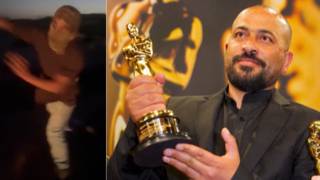
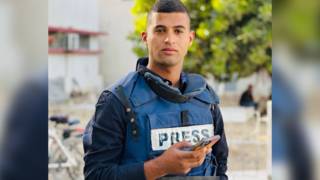
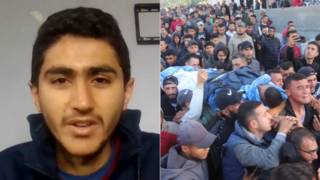
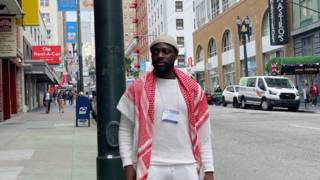





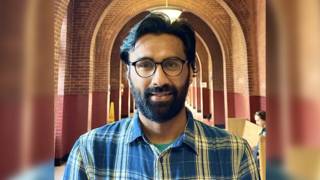
Media Options